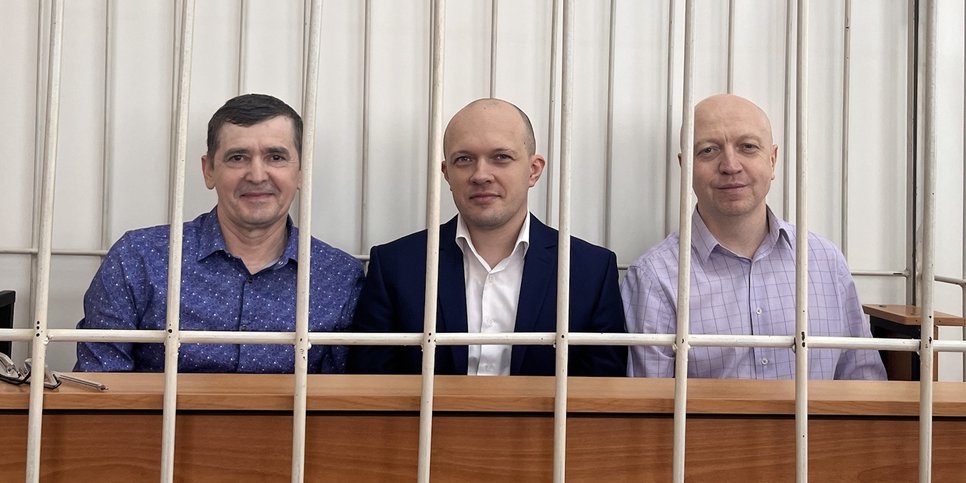From left to right: Sergey Kosyanenko, Rinat Kiramov and Sergey Korolev in the courtroom
From left to right: Sergey Kosyanenko, Rinat Kiramov and Sergey Korolev in the courtroom
Seven Years in a Penal Colony for Discussing the Bible—A Court in the City of Akhtubinsk Rendered Its Decision Against Three of Jehovah's Witnesses
Astrakhan RegionOn April 17, 2023, the Akhtubinsk District Court announced the verdict against Sergey Korolev, Rinat Kiramov and Sergey Kosyanenko. For discussing Bible topics with friends via videoconferencing, Judge Anatoly Proskurin found them guilty of extremism and sentenced each to seven years in a penal colony.
In addition to the main punishment, the court deprived the believers of the right to engage in activities related to directing or participating in the work of public organizations for a term of three years with restriction of freedom for a term of one year. Korolev, Kiramov and Kosyanenko insist that they are innocent, and they can appeal this verdict. Earlier, the prosecutor had requested that each be sentenced to eight years in a general regime penal colony.
The persecution of these believers began on November 9, 2021, when the Investigative Department of the Investigative Committee of the Russian Federation for the Astrakhan Region initiated a criminal case against them for organizing the activities of an extremist organization. After searches in the city of Akhtubinsk and Znamensk, security forces detained Korolev, Kiramov and Kosyanenko and placed them in a temporary detention center. Two days later, the court imposed the preventive measure of pre-trial detention. Later, the investigation brought additional charges against the believers—financing the activities of an extremist organization. All three have been behind bars for almost a year and a half.
At the end of October 2022, the case went to court. Twenty-two witnesses were interrogated. Not one of them provided evidence that the believers were involved in the crimes.
“Throughout the entire process, no evidence of what we are accused of has been provided,” emphasized Rinat Kiramov. "The case file states that I had a real opportunity to stop the unlawful activities of the congregation of Jehovah’s Witnesses; really, it should be stated differently: 'Kiramov could have stopped worshiping Jehovah but did not do so; thus he committed a grave crime.'"
In his final statement, Sergey Korolev said that he was getting together with his friends simply to read the Bible, sing songs, and pray. “The law on combating extremist activity cannot be used to restrict the freedom of religion of peaceful people who are not extremists,” he told the court.
Since their detention began, the believers have already faced many difficulties, including deteriorating health. Sergey Kosyanenko, for example, was kept in a cell with a broken window for three weeks during winter. The whole time he had to wear a jacket, a hat, and gloves. The support of family and friends helps him to overcome these trials. Kosyanenko's wife, Olga, said: “We gave Sergey photographs of each member of our family—there are seven of us—and when he is sad, he looks at the photo, recalls the moment when it was taken, and imagines being with us. He has a very positive attitude." Those persecuted for their faith reported: “We received a lot of letters not only from Russia but also from different countries. Also, our fellow believers sent us packages and postcards with words of support.”
“The courts in the Astrakhan region showed particular bias and even hatred toward Jehovah's Witnesses. At the moment, guilty verdicts have already been rendered against eight believers in the region. And all of them, including two women, were sentenced to long terms in a penal colony,” said Yaroslav Sivulskiy, a representative of the European Association of Jehovah’s Witnesses.
Roman Lunkin, Head of the Center for the Studies of Problems of Religion and Society at the Institute of Europe of the Russian Academy of Sciences, commented on the guilty verdicts against believers in Russia: "Sadly, the persecution of Jehovah's Witnesses is based on a rather primitive, even domestic, logic: they simply are not liked by those in society who often know nothing about the doctrine and practice of Jehovah's Witnesses."



